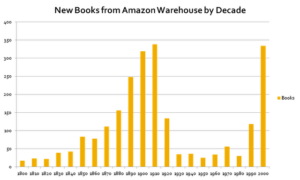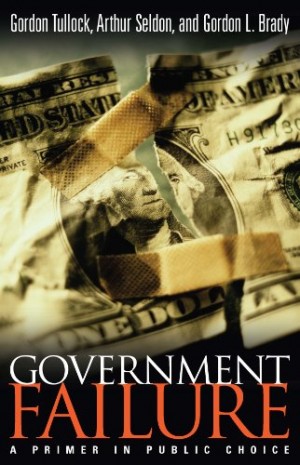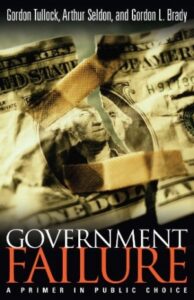

How gigantically humongous and intrusive is the federal government? A traditional measure is to look at the pages of regulations in the Federal Register, which is, by now, probably the world's largest book collection. The problem with this approach is that it takes no account of how a single bad regulation can have monstrously deleterious effects.
Copyright regulation is a good example of this. There was no universal enforcement until the very late part of the 19th century, and terms were mostly short in the early days of this regulation. In the course of the 20th century, regulations became ever more tight and the copyright terms ever longer, so much so that today, the words you sign away to a conventional publisher are theirs to keep for your lifetime plus 70 years!
One standard argument for doing this is that noncopyrighted works will not be efficiently exploited. You have to assign ownership or else the resource will vanish into the ether. No one will care about it, and civilization will lose extremely valuable literary works. Our market for ideas will be impoverished.
Now, to me, this argument seems obviously false, but that's probably because of my own experience in publishing. I've seen it happen — so many times that it is predictable — that once a work has fallen out of print but is still under some kind of protection, it is mostly neglected by the heirs. No one who “owns” the work has the incentive to bring it to light, while those who care about it fear the law or don't want to pay some arbitrary price set by the owners.
Meanwhile, when a work is public domain, there are dozens of people bidding to get it into print. This was true all throughout history, actually. The reason American school kids in the 19th century read British literature is that it was not regulated in the United States, and therefore, it could be sold very cheaply and distributed very widely. It is true today: Whether music or books, the material in the commons is far more in demand than that which is regulated. And the demand leads to the supply.
In other words, the opposite of the conventional exploitation theory is correct. The copyrighted works drop from memory, while the public domain works last and last. But of course, this observation draws from my deep involvement in the industry, and we can't expect academic scribblers to understand anything about how the world actually works in real life.
[continue reading…]
Help Promote Prometheus Unbound by Sharing this Post


Michael Stackpole, a traditionally published author who was one of the early champions of self-publishing ebooks, has an interesting post analyzing the settlement agreed to by three of the Big Six publishers — Hachette, HarperCollins, and Simon & Schuster — involved in the alleged ebook price fixing flap. If he's right, the Department of Justice is going to be imposing more injustice than just preventing a little self-destructive collusive fixing of high prices. This is yet another among so many many many examples of the state stepping in to prevent something only to impose that very thing itself. Yes, it looks like the DoJ is going to prevent price fixing of one sort only to impose its own brand of price fixing. But hey, it's only a bad thing when non-state entities do it, right?
Here is Stackpole's breakdown of the settlement provisions:
- For a period of two years,
- Publishers will not be able to set a restricted retail price for their product.
- Retailers will be able to set their own price for an ebook, but they cannot discount the bookbelow their own discount. (In short, the retailer cannot sell ebooks at a loss.)
- Publishers cannot “retaliate” against retailers during this time.
- The “favored nation” status that prevented a publisher from selling at a lower price to one retailer over another is gone.
- The Agency Pricing discount of 30% off the top that retailers pay publishers can remain in place.
- There are compliance procedures being set in place (that I don't bother discussing) so the government can make sure that the publishers are complying with the agreement.
That's right. Provision #3 fixes an arbitrary minimum price —a price floor. Retailers like Amazon will not be allowed to sell ebooks below the price they pay publishers for them; they will not be allowed to sell at a loss. For two years. And apparently there is yet more intrusive bureaucracy being set up to monitor compliance with these new regulations for the ebook market. It's another shovel-ready Obama jobs program!
The federal government is also going to prevent publishers from requiring retailers sell their ebooks for a certain price. In other words, it bans the agency model. Now, I'm no fan of the agency model, and I think it's self-destructive for publishers to adopt it in order to screw their customers with high prices so that they can prop up their dead-tree book business model for a while longer. But I don't think they should be prevented by law from doing so.
Stabilization is Chaos: “Monetary policy all over the world has followed the advice of the stabilizers. It is high time that their influence, which has already done harm enough, should be overthrown.”
— F.A. Hayek, 1932
The federal government is also going to prevent publishers from retaliating against retailers for the prices they set. Also, no more contracts that stipulate publishers can't sell to other retailers at a lower price. In other words, the state is going to short circuit the market process by preventing publishers from putting any kind of meaningful pressure on retailers and vice versa. No jockeying for position in the ebook market. Forget letting consumers decide and the best business model win. The United States federal government prefers stasis — the maintenance of a status quo of its own making.
But wait, there's more. Stackpole does the math and argues that far from preventing publishers from fixing high prices for consumers, the settlement will actually disincentivize both publishers and retailers from setting lower prices:
[continue reading…]
Help Promote Prometheus Unbound by Sharing this Post




